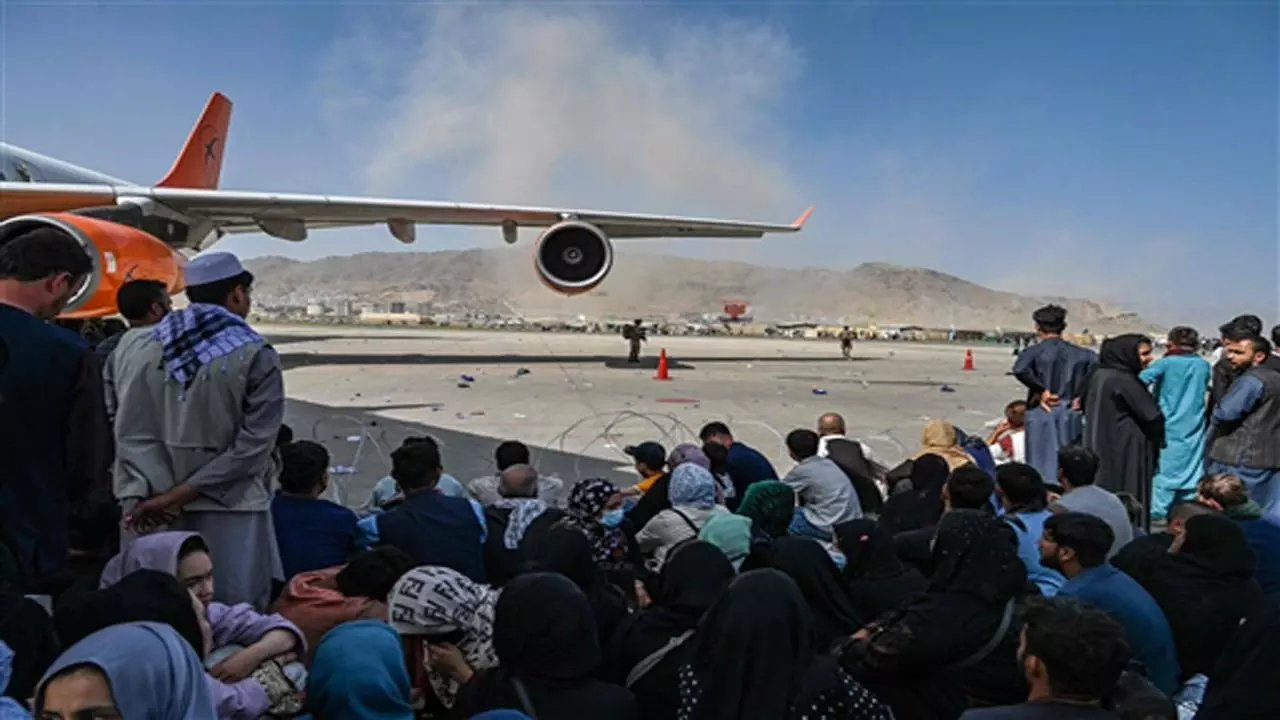
The question raised by Taliban
text_fieldsImage for representation only
After two decades, the Taliban has once again captured dominance in Afghanistan, creating uncertainty about the Afghan peace talks with US initiated in Doha under UN auspices. Right when the Taliban had got control of the provincial capitals of Mazar-e-Sharif, Herat, Jalalabad and Kandahar, it had become clear that the country was going under their control. Finally, with President Ashraf Ghani abdicating power and fleeing the country, the picture became complete. With the added element of mass exodus of natives and foreigners, scared with memories of the of the Taliban rule earlier, anxiety seems to rule both within and outside Afghan. Taliban, which declared an Islamic Emirate, instead of an Islamic Republic, has claimed that it is fully committed to upholding the spirit of the Doha peace talks and that it is in a move to ensure a peaceful transfer of power. Close on the heels of Ashraf Ghani's flight, a reconciliation panel has been formed consisting of former President Hamid Karzai, former Hizb-e-Islami leader Gulbuddin Hekmatyar, former foreign minister Abdulla Abdulla, it is too early to be sure of Taliban co-operating with it. They are reiterating that what is needed is not any short-term interim mechanism, but real transfer of power. The latest development is that China, which a few days ago had held bilateral discussions, has declared its support to a Taliban rule. Last month in Beijing, Taliban leader and the Chinese foreign minister had held talks at which both sides had assured each other that bilateral relations would be strengthened. On the other side, the US, which is a party to the Doha agreement, has not made any response to this. At the same time, Afghan citizens in the US staged a strong protest before the White House against the US act of gifting power to the Taliban in a platter.
It had been as clear as daylight that with the pullout of the US, the Taliban would tighten its grip over Afghanistan. Therefore, the western powers were only pondering over how much they could delay the Taliban, which they had once overpowered, rising its head again and how far they could reduce its damage. That was how they converged on the concept of ensuring transfer of power by placing Qatar in the role of mediator. The US paved the way for the Doha Agreement, involving most of the major powers of the world. As a matter of fact, the US and allied forces were ensuring a safe exit out of their entanglement in the Afghan occupation, which for the US ended in a worse disaster than the Vietnam occupation of the 70s. Some of the items of the Agreement were that the Afghan soil would not be made available for terrorist outfits including Al-Qaeda in a manner causing threat to America and allied forces; members of the Taliban would not have any relations or co-operation with them; Taliban would not co-operate with such outfits' recruitment, training or fund-raising and that travel permit would be denied to those who pose a threat to the US and allied countries. The agreement also had expressly provided that active bilateral relations would be maintained with America, and that America would be actively involved with economic co-operation in the development efforts of a new Afghan Islamic government.
As per the Doha Agreement, the US and allies have been preparing to complete the troop withdrawal from Afghan by the end of this month and to hoist a united front government under its control. It was amidst such preparation the Taliban made its whirlwind offensive upsetting that apple cart. In fact the occupying forces had erred in its withdrawal too. The Afghan government that had existed under the US umbrella, was seen surrendering the country's provinces one after the other and finally the ruler himself had to flee the country surrendering the very country to the enemy. As per the report submitted by the US Congress' Special Inspector General for Afghanistan Reconstruction, the US has spent USD 88 billion for Afghanistan's security alone. The report also mentioned that corruption was the reason behind the fact that despite deploying three lakh soldiers after intensive training, the Afghan government forces could not hold out against the Taliban. It was also found that Pakistan was behind Taliban and several other external forces were with them. If despite all this, America could not offer any effective defence, the question whether it was because it could not fulfil that, or whether the remainder of the game played out all these years in Afghan is yet to come, is one whose answer is to emerge in the near future. At any rate, the Taliban victory has pushed into the darkness of anxiety not only the common man of Afghanistan but also neighbouring countries including India. The people who on Monday were seen running after planes in panic at Kabul airport to leave the country present the real picture of today's Afghanistan. Will Taliban be prepared to redraw that picture? For that to happen, the question raising curiosity is whether the international community is capable of holding the Taliban within the peace diagram drawn out in the Doha Agreement.






















